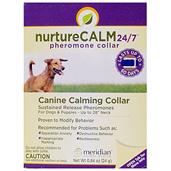Problem behaviors in dogs sometimes result
from boredom and a lack of activity. It isn't too surprising
that a dog that spends 10 to 12 hours a day alone will find a way to
entertain himself and sometimes not in the most acceptable manner.
If your dog seems to "get into trouble" while you are gone, try
increasing the amount of exercise and attention that he gets before
you leave. A tired dog will likely sleep away a large portion
of the day and is less likely to chew your shoes or dig in your garden.
Also, give your dog some special toys to play with when you are away. Toys that dispense treats are especially good as
long as your dog is not overweight. If your dog seems nervous
or upset when you prepare to leave, separation anxiety might
be to blame. A variety of anxiety relief medications for dogs exist, and you will need to talk to your veterinarian to determine which one is right for your pet.
"Is it any wonder that dogs in this situation quickly figure out 'if I bark, they will come.'"
The list of canine behaviors that owners
complain about is long and varied, including:
- Destructive
chewing
- Jumping
on furniture
- Excessive
barking
- Aggressiveness – always
talk to your veterinarian if people or other pets are in danger
- Fearfulness and anxiety
- Housetraining
problems
- Eating
feces
Reward versus Punishment
Behavioral problems also develop because
the people in a dog's life inadvertently reward the very behavior
that they are trying to get rid of. This often happens because
people misconstrue what a dog is seeking when it performs a particular
behavior. Dogs want attention; even negative attention is better
than being ignored in their eyes. Let's take a look at the problem
of excessive barking as an example.
A dog is in the backyard by himself.
His owners are inside. The dog is lonely and wishes someone would
come outside. He barks a couple of times, and lo and behold, his
owner steps out the door and tells him to be quiet. He just got
what he wanted – attention. Is it any wonder that dogs in this
situation quickly figure out "if I bark, they will come."

The way to rectify this situation is
to only give the dog what he seeks when he is acting appropriately –
being quiet in this instance. The owner should only go outside
when the dog is quiet, and if the dog barks excessively during this
time, the owner should walk away and ignore the dog until he is quiet
again. Note that negative reinforcement (i.e., punishment) plays
a very small role here. The only time that negative reinforcement
should be used is when it is non-abusive and does not seem to originate
from the owner. Hitting, screaming, etc. is cruel and will only
make matters worse.
On the other hand, anti-bark collars can be an effective tool in this situation.
If a dog barks while wearing such a collar, he receives an annoying
but non-painful spray to the face that seemingly comes out of nowhere.
If every time that a dog barks, his owners ignore him and/or he gets
a maddening squirt to the face, he will very quickly figure out that
barking does not get him what he wants.
Modifying a dog's behavior requires
consistency, fairness, and patience. If despite your best efforts
the problems continue, talk to your veterinarian. Sometimes a
change in behavior is a result of an underlying medical problem.
Your vet can also recommend an effective trainer or refer you to a veterinary
behaviorist.
The above is provided for information purposes only and should not be used for the diagnosis or treatment of any condition.
This information does not cover all possible variables, conditions, reactions, or risks relating to any topic, medication, or product and should not
be considered complete. Certain products or medications may have risks and you should always consult your local veterinarian concerning the treatment of
your pet. Any trademarks are the property of their respective owners.